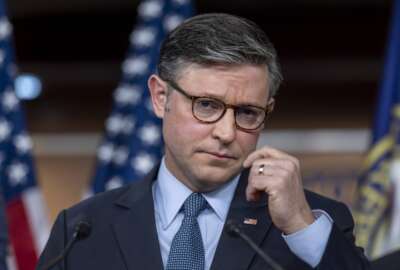No DoDwide Cyber Command in the Near Future
Deputy Secretary England Calls for More Focus on Workforce Training, Capabilities
By Jason Miller
Executive Editor
FederalNewsRadio
There are too many organizations trying to address cybersecurity in the government. Defense Deputy Secretary Gordon England says the federal response needs to be more like a tip of the spear.
“Today we have a lot of people working a lot of organizations, but that is like broad front and not a spear, so we need to work hard on the organizations,” says England after a cybersecurity conference sponsored by AFCEA in Washington Dec. 10. “We’ve been doing that. We need to get better focus, synergy and integration between all the elements of DoD.”
England says DoD has discussed creating a department-wide cyber command-similar to what the Air Force looked into-but no decision was made to create one.
“I think it will be an ongoing discussion, but it is the kind of discussion we need to have,” he says. “I wouldn’t support one now. I think greater emphasis, more consolidation on what we are doing, but I wouldn’t just have a separate cyber command.”
The Air Force decided against creating a cyber command as well and instead created a cyber number wing command, which is under a major command.
England says the key to improving cybersecurity across DoD must begin with improving its workforce capabilities.
All federal agencies have suffered from a lack of technical skills for years. Cybersecurity experts are in great demand and agencies are competing with vendors to hire people with certain skills.
But without these skilled workers, England says network security will remain at risk.
“In protecting your network, process matters a lot,” he says. “But still at its core is the technical knowledge of the workforce.”
In fact, England says the lack of a skilled workforce worries him more than what other countries are doing to develop cyber capabilities.
“The real need is to develop our own capabilities,” he says. “We need a skilled workforce to overcome broad technical challenges.”
The Air Force is trying to solve their cyber workforce challenge. The service made cybersecurity a career path.
Col. Rickey Rodgers, the director of the Air Force Air Component Coordination Element to the U.S. Strategic Command’s Joint Functional Component Command for Network Warfare, says they are taking a lot of people from previous career fields into the new cyber career field.
“As we progress, there will be people straight from college, just pinned on lieutenants and enlisted people just finished training, they will go straight into the career field,” Rodgers says. “So we are really excited about that. We think that will shore up a lot of our shortfalls there.”
Rodgers says it may take a fair amount of time before the Air Force gets enough trained employees to meet their needs. In the short term, the goal is to secure the Air Force networks as best as possible.
“We’ve made a lot of changes,” he says. “We’ve flattened out our structure to let us respond faster to cyber incidents.”
Rodgers adds that the Air Force is in the process of integrating offensive and defensive operations into one organization.
Overall, the cyber threat is causing DoD to change its way of thinking, England says.
“It is clear that cyber attacks will be part of future warfare,” he says. “Much like the first use of gun powder changed the nature of warfare centuries ago, we are at the very very early stages of this planning and thinking. This threat is a priority of this administration and it will be of the next administration and the next Congress.”
—–
On the Web:
FederalNewsRadio – DoD wants security assurances from vendors
FederalNewsRadio – DoD to Lay Out Cyber Priorities
Air Force – Air Force working to build cyber warrior career fields
(Copyright 2008 by FederalNewsRadio.com. All Rights Reserved.)
Copyright © 2024 Federal News Network. All rights reserved. This website is not intended for users located within the European Economic Area.





